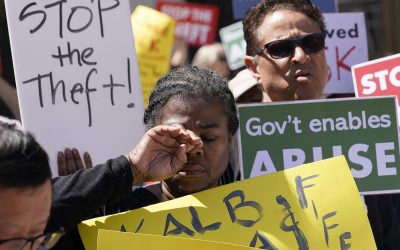Lurking fascism: How the conflation of “partisan” and “political” became a danger to liberal democracy
By Lawrence Torcello, Associate Professor of Philosophy, Rochester Institute of Technology “The personal is political!” is a well-known rallying cry, originally used by left-leaning activists, including feminists, to emphasize the role of government in personal lives...
True cost of E-commerce: Inside the black box of Amazon’s product returns
By Simone Peinkofer, Assistant Professor of Supply Chain Management, Michigan State University E-commerce may make shopping more convenient, but it has a dark side that most consumers never see. Say you order an electric toothbrush for Father’s Day and two shirts for...
Kent Cooper: How a journalism titan of 20th-century led Associated Press to transform the news industry
By Gene Allen, Adjunct Professor, Journalism/Communication and Culture, Toronto Metropolitan University On the day of Kent Cooper’s funeral in February 1965, the flow of news through the international Associated Press network, the institution he spent a 40-year career...
Infringement or fair use? Why generative AI is a minefield for U.S. copyright law
By Robert Mahari, JD-PhD Student, Massachusetts Institute of Technology (MIT); Jessica Fjeld, Lecturer on Law, Harvard Law School; and Ziv Epstein, PhD Student in Media Arts and Sciences, Massachusetts Institute of Technology (MIT) In 2022, an AI-generated work of art...
Study finds unprecedented global warming could cause Himalayan glaciers to lose 80% of their volume
Glaciers are melting at unprecedented rates across the Hindu Kush Himalayan mountain ranges and could lose up to 80% of their current volume this century if greenhouse gas emissions are not sharply reduced, according to a new report. The report in June from...
Rents on the Rise: Eviction filings in some cities are 50% higher than they were pre-pandemic
Entering court using a walker, a doctor’s note clutched in his hand, 70-year-old Dana Williams, who suffers serious heart problems, hypertension and asthma, pleaded to delay eviction from his two-bedroom apartment in Atlanta. Although sympathetic, the judge said...
When homes flood: Why distance and race play a role in FEMA buyouts after a natural disaster
By James R. Elliott, Professor of Sociology, Rice University; and Zheye (Jay) Wang, Senior Spatial Research Analyst, Kinder Institute for Urban Research, Rice University After Hurricane Ida hit New Orleans in 2021, Kirt Talamo, a fourth-generation Louisianan, decided...
Involuntary treatment: The ethical dilemmas of plans to target homelessness, mental illness, and addiction
By Katherine Drabiak, Associate Professor of Health Law, Public Health Law and Medical Ethics, University of South Florida Over the past year, cities across the United States have unveiled new policy plans to address homelessness amid rising concerns about health and...
Anxiety and Depression: How healthy coping mechanisms can save victims of trauma from PTSD
By Cyril Tarquinio, Professeur de psychologie clinique, Université de Lorraine Those who have experienced the horrors of war see their lives clearly delineated between a “before” and an “after.” This singular ordeal does not, as is often believed, mean that it is...
Overcrowded trains: Why a relic of Colonialism still serves as the metaphor for India in Western eyes
By Ritika Prasad, Associate Professor of History, University of North Carolina – Charlotte A devastating rail crash that left almost 300 people dead has refocused international attention on the importance of railways in the lives of Indians. To many Western observers,...
Ad Astra: The “not-quite-a-space-race” between China and the United States
By Svetla Ben-Itzhak, Assistant Professor of Space and International Relations, Air University Headlines proclaiming the rise of a new “space race” between the United States and China have become common in news coverage following many of the exciting launches in...
Every Head Counts: How 2020 census data helps guide the allocation of $2.8T in annual Federal spending
The head count of every U.S. resident in 2020 helped guide the distribution of $2.8 trillion in annual federal spending, underscoring the importance of participating in the once-a-decade census, according to a new report released in June by the U.S. Census Bureau....





















